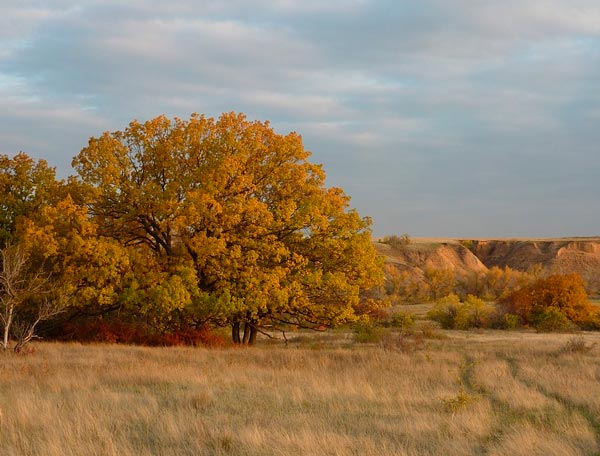This work of the poet's early work was written by Tyutchev in 1830 during his visit to Russia. The poem is created in a light spirit, gracefully and filled with classical romanticism. The author reveals an autumn evening to the reader, for him it is not just another time of day, for Tyutchev it is something more.
The poem is filled with metaphors, for example, the author sees how nature smiles and therefore compares it with some kind of divine bashfulness. The work consists of only twelve lines, Tyutchev used cross-rhyming. The description of nature in the poem is bright, saturated with the colors of autumn, but at the same time very changeable. Tyutchev colorfully conveyed the description of autumn evenings, when the sun saturates the earth with even brighter colors. Such a rich description of nature contains the combination of various artistic means, such as gradation, personifications, metaphors and epithets.
The poet does not separate nature and man, but draws a line between them. With the help of personifications, a parallel is created between the images. In Tyutchev's understanding, autumn is like a person's maturity.
Analysis of the poem number 2
A little sadness... A little sadness... Only twelve lines, but they do not leave the reader indifferent. Every word describing the autumn evening touched me too. “Touching charm”, “ominous brilliance”, “sadly orphan land”, “shamefulness of suffering” - is it possible to more accurately describe the mood of the past summer?
I easily imagined a forest in which the foliage played with colorful colors, a light breeze blew. It is this picture that arises after reading these lines: “the crimson leaves are languid, light rustle, foggy and quiet azure over the sadly orphaned earth.”
In order to create a feeling of a living presence, Fedor Ivanovich Tyutchev uses various artistic techniques: epithets, personification, comparison, inversion.
So, for example, the inversion “there is a touching, mysterious charm in the lordship of autumn evenings” gives the poem a melodic sound, and the comparison “like a premonition of descending storms, a gusty, cold wind at times” - a feeling of cold and impending winter. The metaphor "smile fading" once again reminds of falling asleep nature. And the personifying epithet "sadly orphaned land" causes melancholy and despondency.
Autumn evening F.I. Tyutchev is quiet and mysterious. There is not even a song of birds in it, the earth is shrouded in silence, only a slight rustle of leaves sometimes disturbs peace. But, despite the withering, nature in the image of the poet is charming.
"Autumn Evening" F. Tyutchev

"Autumn Evening" Fyodor Tyutchev
Is in the lordship of autumn evenings
A touching, mysterious charm:
The ominous brilliance and variegation of trees,
Crimson leaves languid, light rustle,
Foggy and quiet azure
Over the sad orphan land,
And, like a premonition of descending storms,
A gusty, cold wind at times,
Damage, exhaustion - and on everything
That gentle smile of fading,
What in a rational being do we call
Divine bashfulness of suffering.
Analysis of Tyutchev's poem "Autumn Evening"
The landscape poetry of the poet Fyodor Tyutchev rightfully occupies a worthy place in Russian literature of the 19th century. And this is not surprising, since the author of numerous poems about the beauty of nature managed to organically combine the traditions of Russian and European literature in his works. The poems of Fyodor Tyutchev are designed in the spirit of classical odes, both in style and in content, but they are much more modest in size. At the same time, there is European romanticism in them, which is associated with Tyutchev's passion for the work of such poets as Heinrich Heine and William Blake.
The literary heritage of Fyodor Tyutchev is small and includes about 400 works, since the author devoted his entire life to the diplomatic public service, carving out rare free hours for creativity. However, a magnificent example of classical romanticism is his poem "Autumn Evening", written in 1830. At this time, Fedor Tyutchev was in Munich, acutely feeling not only loneliness, but also homesickness. Therefore, an ordinary October evening inspired not only sad memories for the poet, but also set him in a lyric-romantic mood. which, in turn, prompted the writing of a very elegant, exciting and filled with deep philosophical meaning poem called "Autumn Evening".
It would seem that autumn itself evokes a feeling of longing, which is subconsciously associated with the extinction of life, the completion of another cycle that makes a person older. Approximately the same feelings are evoked by the evening twilight, which the Symbolists associate with old age and wisdom. However, at the time of Tyutchev, it was not customary in literature to express themselves through symbols, so the author tried to find positive moments in the obviously sad combination of autumn and evening. from the first lines of the poem, emphasizing that "the lordship of autumn evenings" has a special, inexplicable charm. Watching the autumn twilight fall on the “sadly orphan land”, the poet managed to catch the moment when the last rays of light touched the multi-colored treetops, flashing in bright foliage. And Fyodor Tyutchev compared this amazingly beautiful phenomenon with the “mild smile of withering” of nature. And - he immediately drew a parallel with people, noting that in rational beings such a state is called "divine bashfulness of suffering."
It is noteworthy that in the poem "Autumn Evening" the poet does not share such concepts as living and inanimate nature. rightly believing that everything in this world is interconnected, and a person often copies in his gestures and actions what he sees around. Therefore, autumn in the work of Fyodor Tyutchev is associated with spiritual maturity, when a person realizes the true price of beauty and regrets that he can no longer boast of a fresh face and a clean look. And the more he admires the perfection of nature, in which all processes are cyclical and at the same time have a clear sequence. A huge mechanism, launched by an unknown force, never fails. Therefore, a feeling of lightness and joy is mixed with a slight sadness, which is inspired by trees shedding their foliage, early evenings and gusty cold winds. After all, autumn will be replaced by winter, and after that the surrounding world will again change beyond recognition and will be full of rich spring colors. And a person, having passed the next life cycle, will become a little wiser, having learned to find sensual pleasure in every lived moment and appreciate any season, depending on the vagaries of nature, his own preferences and prejudices.
"Autumn Evening", analysis of Tyutchev's poem

The poem "Autumn Evening" refers to the period of the early work of F. I. Tyutchev. It was written by the poet in 1830 during one of his short visits to Russia. Created in the spirit of classical romanticism, an elegant, light poem is not just landscape lyrics. Tyutchev comprehends the autumn evening in it as a phenomenon of the life of nature, looking for an analogy to the phenomenon of nature in the phenomena of human life, and these searches give the work a deep philosophical character.
is an extended metaphor: the poet feels "a gentle smile of fading" autumn nature, comparing it with "divine bashfulness of suffering" in man as a prototype of morality.
The poem is written iambic pentameter. cross rhyming is used. A short, twelve-line poem is one complex sentence, read in one breath. The phrase "mild smile of fading" combines all the details that create the image of fading nature.
Nature in the poem is changeable and many-sided, full of colors and sounds. The poet managed to convey the elusive charm of autumn twilight, when the evening sun changes the face of the earth, making the colors richer and brighter. Brightness of colors ( azure, crimson leaves, shine, variegation of trees) is slightly muffled by epithets that create a translucent haze - foggy, light.
To depict a picture of autumn nature, Tyutchev uses the technique of syntactic condensation, combining various means of artistic expression: gradation ( "damage". "exhaustion"), personification ( "a languid whisper" leaves), metaphors ( "ominous brilliance" , "Wilting Smile"), epithets ( gentle, meek, bashful, misty).
"Autumn Evening" is full of diverse in structure and meaning epithets- synthetic ( "ominous brilliance and variegation of trees"), color ( "crimson leaves"), complex ( "sadly orphaned"). Contrasting epithets - "touching, mysterious charm" And "ominous brilliance". "foggy and quiet azure" And "gusty, cold wind"- very expressively convey the transitional state of nature: farewell to autumn and a premonition of winter.
The state of nature and feelings of the lyrical hero helps to express used by Tyutchev alliteration. which creates the effect of falling leaves ( "Crimson leaves languid whisper"), fresh breath of wind ( "And, like a premonition of descending storms / / A gusty, cold wind").
The poet is characterized by a pantheistic interpretation of the landscape. Tyutchev's nature is humanized: like a living being, it breathes, feels, experiences joy and sadness. Tyutchev perceives autumn as a meek suffering, a painful smile of nature.
The poet does not separate the natural world from the human world. The parallel between these two images is created using personifications and compound epithet "sadly orphaned". emphasizing the theme of farewell. Light sadness, inspired by the foreboding of the imminent winter, is mixed in the poem with a joyful feeling - after all, nature is cyclical, and after the coming winter, the world around us will be reborn again, full of rich spring colors.
In the instant impression of the autumn evening, Tyutchev contained his thoughts and feelings, all the infinity of his own life. Tyutchev compares autumn with spiritual maturity, when a person acquires wisdom - the wisdom to live and appreciate every moment of life.
"Autumn evening", Tyutchev F.I. poem analysis

January 20, 2014
Fedor Ivanovich Tyutchev is one of the great Russian poets of the 19th century, who subtly felt the beauty of the surrounding nature. His landscape poetry occupies a significant place in Russian literature. "Autumn Evening" is Tyutchev's poem, which combines European and Russian traditions, reminiscent of a classical ode in style and content, although its size is much more modest. Fedor Ivanovich was fond of European romanticism, his idols were William Blake and Heinrich Heine, so his works are sustained in this direction.
The content of the poem "Autumn Evening"
Tyutchev left behind not so many works - about 400 poems, because all his life he was engaged in diplomatic civil service, there was practically no free time for creativity. But absolutely all of his works are striking in their beauty, lightness, and accuracy in describing certain phenomena. It is immediately clear that the author loved and understood nature, was a very observant person. "Autumn Evening" Tyutchev wrote in 1830 during a business trip to Munich. The poet was very lonely and dreary, and the warm October evening inspired him with memories of his homeland, set him in a lyric-romantic mood. And so the poem "Autumn Evening" appeared.
Tyutchev (analysis shows the fullness of the work with a deep philosophical meaning) did not express himself with the help of symbols, in his time this was not accepted. Therefore, the poet does not associate autumn with the fading of human beauty, the fading of life, the completion of the cycle that makes people older. Evening twilight among the Symbolists is associated with old age and wisdom, autumn evokes a feeling of longing, but Fyodor Ivanovich tried to find something positive and charming in the autumn evening.
Tyutchev simply wanted to describe the landscape that opened to his eyes, to convey his vision of this time of the year. The author likes the "lightness of autumn evenings", twilight falls on the earth, but sadness is illuminated by the last rays of the sun, which touched the tops of the trees and illuminated the foliage. Fyodor Ivanovich compared this unusual phenomenon with "the meek smile of withering." The poet draws a parallel between people and nature, because in a person such a state is called suffering.
The philosophical meaning of the poem "Autumn Evening"
Tyutchev in his work did not distinguish between animate and inanimate nature, because he considered everything in this world to be interconnected. People very often even unconsciously copy some actions or gestures that they see around. Autumn time is also identified with a person, associated with his spiritual maturity. At this time, people stock up on knowledge and experience, realize the value of beauty and youth, but cannot boast of a clean look and a fresh face.
"Autumn Evening" Tyutchev wrote with a slight sadness about the irrevocably gone days, but at the same time with admiration for the perfection of the world around him, in which all processes are cyclical. Nature has no failures, autumn brings melancholy with a cold wind tearing off yellow leaves, but winter will come after it, which will cover everything around with a snow-white blanket, then the earth will wake up and be full of juicy herbs. A person, experiencing the next cycle, becomes wiser and learns to enjoy every moment.
Nature in the verses of F.I. Tyutchev: analysis of the poem "Autumn Evening"
Analysis of the poem "Autumn Evening"
Fyodor Tyutchev's poem "Autumn Evening" plunges the reader into an amazing state of contemplation, expectation of changes of slight anxiety, sadness and hope.
At the beginning of the poem, the author is immersed in a lyrical mood. In the first two lines, he notes the charm, peace and silence of the autumn sunset, filled with a quiet mysterious light. The poet is touched by observing a peaceful and, at the same time, full of secret meaning picture of the withering of the day and life.
But, by the third line, the mood of the poet is changing. In the sunset light falling on the foliage, in its vibration from the slight movement of air, he sees a hidden threat. The effect of anxiety is achieved through the use of sound writing (ominous shine, variegation, rustling) - an abundance of hissing and whistling creates a sharp sudden contrast with the first lines, and color descriptions (shine, variegation, crimson) only add a note of anxiety. The picture, seemingly static, is actually filled with internal tension, anxious expectation of something inevitable.
However, in the next two lines, the author again describes peace, silence, immobility. The sun has set, and the crimson-orange light is replaced by azure, and the brilliance of the last rays of the sun is replaced by a light haze of fog. In place of unconscious anxiety comes a clearer sadness from parting with daylight and summer warmth, personifying life itself. The poet and the nature surrounding him are ready to meekly plunge into winter lethargy.
Sudden gusts of cold wind, harbingers of the future harsh winter, bring them out of a submissive, sleepy and motionless state. But the promise of trials in the future, nevertheless, inspires optimism and hope for the revival of life in the author and reader.
Therefore, the last four lines, in which the words withering, suffering, exhaustion and damage are heard, do not evoke those sad feelings that are inherent in their meaning. The immutability of natural cycles gives the poet, who feels himself and all of humanity as one with the world of nature, confidence in his own immortality, because the autumn withering and winter stillness will surely be followed by a spring awakening, just like the morning, which will certainly come when the night ends.
The poetic size of the text is iambic pentameter with a two-syllable foot and stress on the second syllable. Syntactically, this astronomical poem is one complex sentence. Small in volume, it is saturated with bright, varied epithets expressing opposite states, capacious images, deep philosophical meaning, and internal movement. A sharp picture is replaced by a blurry one, light is replaced by dusk, anxiety is replaced by peace, silence is replaced by sound and vice versa. The skill of the poet is expressed in how he put such a mass of feelings, thoughts and images into a small volume without overloading the composition. The poem remained light, airy, read in one breath and leaves feelings light after reading.
Listen to Tyutchev's poem Autumn Evening
Related Topics
Picture Autumn evening

Picture or drawing Autumn evening








